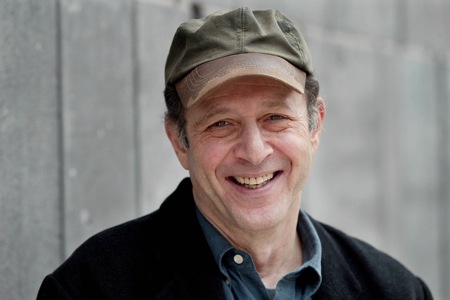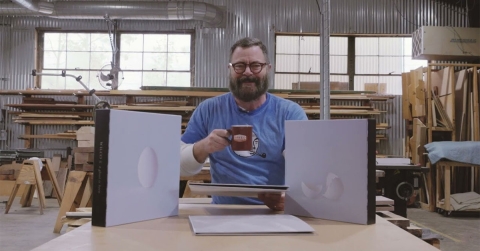The 62nd Ojai Music festival came to a close Sunday night as it began the Thursday before, with the music of featured composer, Steve Reich. It was Reich's first time at the event since he gave the West Coast premiere of his Four Organs there in 1973. This time around, it was So Percussion that performed the piece, and there was plenty more of the composer's work to be heard throughout the event's four days.
The 62nd Ojai Music Festival came to a close Sunday night as it began the Thursday before, with the music of featured composer, Steve Reich. It was Reich's first time at the event since he gave the West Coast premiere of his Four Organs there in 1973. This time around, it was So Percussion that performed the piece, and there was plenty more of the composer's work to be heard throughout the event's four days.
Los Angeles Times music critic Mark Swed reports from Ojai that "audience members sat uniformly transfixed" during the performance, many with smiles on their faces, in noted contrast to the piece's original reception 35 years ago by a bemused concertgoing public unsure of what to make of the new sound.
Swed writes that this offered one example to surface during the Festival of the evolution both in public perception and in Reich's work. He writes of two pieces on the Thursday night all-Reich program in the context of the composer's oeuvre:
Four Organs is pure music creating a psycho-acoustic phenomenon that has the ability to take over your bodily rhythms. To different listeners, that can seem erotic, fascistic or mystical. And Reich has continued to write inspired abstract music. Thursday's concert began with Eight Lines, full of bright, bopping counterpoint.
"But," Swed continues, "as in Bach, counterpoint can lead to profundity," as found in Reich's recent work Daniel Variations, which was performed by Signal ensemble, led by Brad Lubman "with gripping vehemence."
The Festival reached new heights on Sunday morning, feeling "like holy ground," according to Swed, when Reich and some original members of his ensemble performed "his first great score," Drumming (1970-71), with the younger generation of players who comprise So Percussion.
The culmination of the Festival's events was in the closing piece, performed by the Ojai Festival Orchestra led by music director David Robertson: Reich's Tehillim, which, Swed concludes, "lifted the spirits high."

Dawn Upshaw was the Festival's featured performer, and, says Swed, her recital, with pianist Gil Kalish, of an eclectic program Saturday morning proved: "She is a singer who does not stay in the same place. Her voice is filling out, and her involvement in music keeps reaching new levels of intensity." The Orange County Register's Timothy Mangan reports from Ojai as well, calling the recital a "home run" for the Festival:
Upshaw invited the throng into a metaphorical, cozy salon, and sang as intimately as only she can. The English-language songs sent shivers, not the least because of a small thing called diction: We understood every word.
For Swed's coverage of the Festival, visit latimes.com. For Mangan's report, visit ocregister.com.
- Log in to post comments



